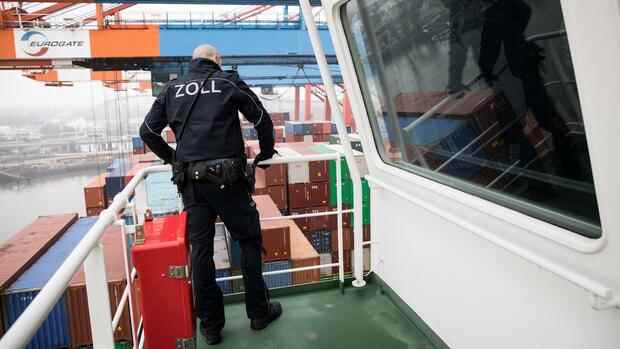Berlin, Brussels Europe must learn the language of power, urged EU Commission chief Ursula von der Leyen at the beginning of her term of office. However, when it comes to an oath, as is now the case in the refugee dispute with Belarus, the EU is still often seen as a paper tiger. “The sanctions against Belarus have so far been more of a symbolic policy,” says Katrin Kamin, economist and expert on geo-economics at the Institute for World Economy (IfW) in Kiel.
To change that, Kamin, together with IfW boss Gabriel Felbermayr, Marcel Fratzscher from the German Institute for Economic Research (DIW) and Guntram Wolff from the Brussels think tank Bruegel, has presented a kind of handbook of geo-economics for the Federal Foreign Office.
In the past, political decision-makers tended to “pursue international security goals and international economic goals separately and with different instruments. This orthodoxy is no longer tenable ”, state the economists and demand more commitment from Germany in particular.
“When it comes to the greater use of geo-economic instruments for foreign policy and foreign trade policy goals, I have so far heard very little from the parties of a possible traffic light coalition,” says Kamin, “in Germany there is still a strong silo mentality.”
Top jobs of the day
Find the best jobs now and
be notified by email.
Brussels is already further there. Valdis Dombrovskis, the Commission Vice-President responsible for trade policy, advocates a foreign trade policy that is not only “open” and “sustainable”, but also “strong”.
Thierry Breton, Internal Market Commissioner responsible for technology promotion, openly promotes the concept of “strategic autonomy” in order to strengthen Europe’s independence in key sectors and thus make the EU less susceptible to blackmail.
Cooperation with the USA
Using the economy as a “weapon” for foreign policy, however, quickly collides in Germany with the economic interests of a country that sends around half of its goods exports outside the EU and is therefore dependent on open borders.
“The openness of the German economy is a central basis of German prosperity,” the authors admit and clearly oppose economic decoupling from important trading partners such as China. It would be better to stand up to China with new trade and investment agreements with the USA and India.
In the technology conflict between the USA and China, Europe cannot stand by the side, say economists.
(Photo: Reuters)
Nevertheless, Europe must assert itself in the power political struggle of the great powers. “We have to find a balance between economic openness and the need to reduce our economic vulnerability,” says Kamin.
The economist does not deny that the contradictions contained in this dual strategy are obvious. “The desire for open strategic autonomy describes Europe’s foreign and foreign trade policy dilemma in just three words.”
In addition, economic, trade and monetary policy are centrally regulated in the EU, but foreign and security policy is still carried out in the national capitals.
The most important lever of power is access to the EU internal market
The most important lever of power that Europe has at its disposal is access to its internal market with almost 500 million consumers. “Europe needs to realize that access to its market is the most important good in all of its international political interactions,” write the economists.
The EU traditionally uses trade agreements to assert its interests internationally. But the past few years, especially the Chinese attempts to coerce economically and the experience with America-first President Donald Trump, have made it clear from Brussels’ point of view that Europe needs new instruments.
But European integration must also be strengthened, demand the economists. Specifically, this means, among other things, completing the banking and capital markets union, advancing the fiscal union and strengthening the euro as an alternative to the US dollar – including digitally. “Europe should also take a proactive stance in developing the digital euro.”
In terms of climate policy, Europe should insist on the planned CO2 border adjustment. The recently reached agreement with the USA on the suspension of protective tariffs against European steel and aluminum imports also contains the idea for a common protection concept against dirty steel imports. “In order to guarantee climate protection and fair working conditions globally, one should throw one’s economic weight in the balance,” says Bernd Lange, Chairman of the Trade Committee in the EU Parliament.
In the technology conflict between the US and China, Europe cannot stand on the side, but must reduce its dependence on the Middle Kingdom, the study says. Investment control to prevent the takeover of key technologies is necessary. The effectiveness of economic sanctions can be increased through better knowledge of the objectives, faster enforcement and aid against collateral damage.
On December 8th, the EU Commission intends to present a package of laws that will expand its geo-economic toolbox. This includes a European supply chain law, which obliges companies to protect basic human rights abroad, as well as a proposal to ward off sanctions, which could even threaten counter-sanctions.
The fact that the Federal Foreign Office is dealing with the new geo-economic realities is met with approval in Brussels. “It is slowly dawning on political Berlin that Germany and Europe are in a global political and economic competition for future technologies of the 21st century,” says Christian Ehler, a member of the CDU.
More: Siemens boss Busch warns: “Don’t become a plaything between the USA and China”
